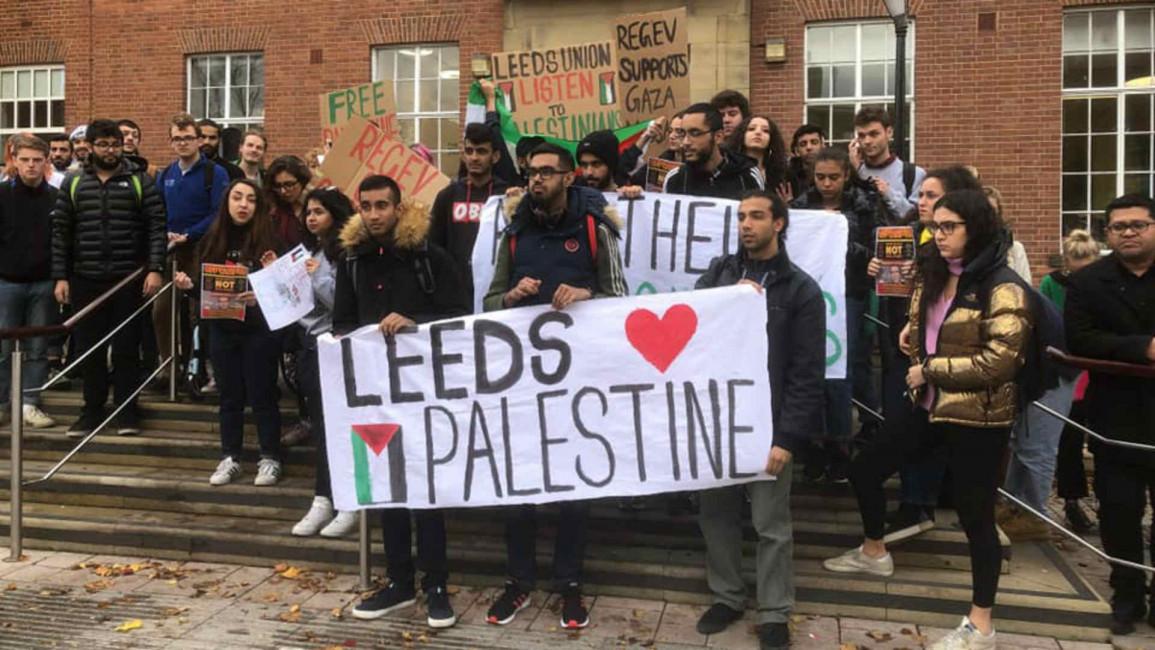
Secret Israeli ambassador university visits testify to power of BDS
Many students and staff were not warned that he would be attending events organised within their institutions.
Similar to last year's speaking tour in the lead up to the centenary of the Balfour Declaration, some students were informed that a "high profile speaker" with a deep understanding of the politics of the Middle East would be coming to speak, but that neither the name nor the venue would be revealed until 24 hours prior the event.
King's College London's (KCL) Action Palestine Society posted in a statement on social media that they were "disturbed to learn that the Israeli Ambassador to the United Kingdom, Mark Regev, has been invited to speak on College premises".
The ambassador is known for his justification of the massacres committed by the Israeli army in besieged Gaza, and support for ongoing apartheid-like policies against the Palestinian people.
The recent tour is seen as a further attempt to normalise the Israeli state's actions across the UK through PR exercises such as campus visits. KCL Action Palestine stated that there was a particular focus on "universities with strong pro-Palestine activism, such as Kings, to claim as PR victories for Israel".
The day after his visit to King's College London, where he was confronted with a vibrant protest, the Ambassador spoke at Leeds University. Given the recent victory of pro-Palestine campaigners in making the university the first in the country to cut investment ties with companies complicit in the Israeli arms trade, this could very well be seen as a tactical trip.
 |
Opposition to Regev must make clear that our universities will not be silent or complicit |  |
The successful BDS campaign was supported by students, staff and alumni after it was uncovered that the institution had invested $3.1million in companies that are complicit in the occupation of Palestine.
The university has therefore been forced to end its contracts with those directly providing military equipment, such as Airbus, United Technologies and Keyence Corporation, and to revise its financial relationships with others, including the bank HSBC.
One has to wonder, then, to what extent do these surprise/secret speaking engagements normalise the behaviour of the Israeli state?
Having organised dozens of events across many campuses in the UK, I can't imagine the possibility of a surprise (especially within the remit of Middle East politics) is exactly enough to bring in large crowds on an evening following a full day of class.
Twitter Post
|
When it comes to political events, even posters and leaflets which advertise a discussion can serve as campaign tools to raise awareness on an issue. The debates which develop in the lead up, then draw in curious minds, as well as those hoping to put forward their arguments.
It is important we do not dismiss the gravity of institutional double standards on speakers, security and freedom of speech, or the total disregard for the security of Palestinians on UK campuses.
City University's Palestinian Society - which is expecting the ambassador on 21 November - highlighted in their statement the dangers for so many Palestinians who risk their ability to re-enter their homeland if they express political opposition to, and while attending event.
"Allowing the Israeli ambassador to speak without making adequate arrangements will result in the School failing to uphold its basic duty of care towards its students, particularly those of Palestinian and Arab origin... many of whom have suffered directly at the hands of the Israeli security services.
"Students wishing to attend a public event on their own campus will be subject to the same questioning and searching they suffered living under military occupation in Palestine. It is unconscionable that City should permit these forms of oppression to be replicated on our campus.
"Furthermore, the proposed event takes place in conditions that make freedom of speech and academic freedom impossible. Those who will try to challenge the Ambassador's propaganda will be putting themselves at the risk of not being able to travel to Israel or the Occupied Palestinian Territory."
While Islamic societies and Palestinian societies have their speakers vetted, policed, or banned - even after long bureaucratic processes in the context of the Prevent policies - the double standard of permitting armed security guards, and the representative of a state which actively undermines the freedom of speech of Palestinian academics and staff, is staggering.
 |
They recognise the effectiveness of the solidarity work being done |  |
That said, the secrecy surrounding Regev's events also proves that we are far from the point of normalisation of Israeli state officials spreading propaganda within these institutions.
Even with very limited lead time, pro-Palestine activists were mobilised, with statements demanding answers from management, as well as the centring of Palestinian voices through open letters and protests on campuses.
Imagine what more could have been possible with weeks to prepare for the visit?
The ambassador portrays his visits as a tour de force, but it is worthwhile asking if the humiliation of a state official having to sneak onto campuses across the country, surrounded by security and campus protection, does not in fact project the opposite: Israel is losing the struggle of normalising its actions.
Twitter Post
|
This of course, is made all the more urgent by the Israeli air strikes on the Gaza strip earlier this week which left 25 Palestinians wounded and seven killed including: Mohammed Zakariya al-Tatari, 27, Mohammed Zuhdi Odeh, 22, Hamad Mohammed al-Nahal, 23, Moussa Iyad Abd al-Aal, 22, Khaled Riyadh al-Sultan, 26, and Musaab Hoss, 20.
In addition, Israelis also targeted Al Aqsa TV and five others buildings in Gaza City. In light of such violence, opposition to the likes of Regev must make clear that our universities will not be silent or complicit with the ongoing advance of settler colonialism in Palestine.
While attacks on Palestine solidarity work can sometimes feel relentless, each BDS victory; each time even a single individual shows opposition to the normalisation tactics of the Israeli state on their campuses or local areas, we are heading in the right direction.
Across the pond, UCLA Students for Justice in Palestine successfully managed to oppose attempts to silence their conference. UCLA Chancellor Gene D. Block even publicly addressed criticism over the event through a statement which defended students' constitutional right to host discussions.
The act of targeting itself, as well as the continued attempts by Regev to normalise his presence on UK campuses, points to the fact that they recognise the effectiveness of the solidarity work being done.
It is a sign that we are being effective, and that we must redouble our efforts. The struggle continues, until Palestine is free.
Follow her on Twitter: @MaliaBouattia
Opinions expressed in this article remain those of the author and do not necessarily represent those of The New Arab, its editorial board or staff.




